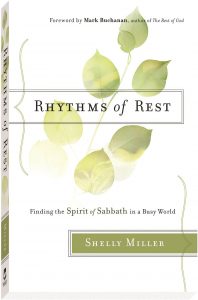It’s the mantra I adopted from my mother-in-law, Geri, more than twenty-five years ago, when I became one of her children, a phrase as familiar as her welcoming blue eyes and the accepting smile we witness as she walks through the gate at the airport when she visits.
I come from a long line of Catholic guilt in my ancestry. A spiritual mutt, I was discipled by the Baptists, infused with the spirit of the Pentecostals, embraced by the nondenominational melting pots of mega churches in the Midwest, and now, serving as an Anglican and the wife of a priest in London, I find that I still need to practice her words often.
Guilt is one of the main roadblocks for making Sabbath a reality.
Guilt about the things we leave undone, and guilt when we don’t rest perfectly. Lofty expectations about a day set apart for rest keep us immobilized, and Sabbath elusive.
Guilt is usually a sign that you’ve made rest a routine with strict rules.
If you struggle with guilt about taking time to rest, then perhaps you are trying to implement a Sabbath routine instead of a rhythm of rest.
A lot of us suffer from the assumption that Sabbath is a routine we create. But God created rest to be as natural as breathing. Sabbath is the exhale required after six days of inhaling our work. And Sabbath isn’t only limited to the weekend.
Routines are meant to be structured with a specific purpose in mind. Think of dancers, cheerleaders, marching bands, taking the trash out before collection, or even the routine of caring for an elderly person. One small misstep has negative implications and sometimes dire consequences.
Routines are often rigid and concrete, correct or incorrect. Usually a person implements rules or follows a routine in order to control a specific outcome. Routines aren’t bad; after all, most of us implement a routine of showering, brushing our teeth, and eating three meals a day. We like knowing when the trash will be picked up.
Rhythms, on the other hand, are nuanced and unique to each individual. Rhythms describe the art of living a life embodied with meaning and intention in the same way God creates. The way you move out, adapt to, and integrate with the world around you is like a free-flowing dance of choices. Pay attention to your surroundings, adapt while remaining open to adjustments, and integrate with the world around you. Rhythms shift while remaining focused on what is most important.
When we adopt Geri’s mantra, I don’t do guilt, a simple act can become sacred when we ascribe meaning to it, separating the mundane from the holy—reciting a special prayer, lighting a candle, and preparing different food from the usual fare.
Sabbath, I learn, is a sacred day separating what is most needful from the smorgasbord of options on your plate. We will feel as though we don’t exactly know how to do it right, but the mystery will woo us back to light the candles the following week. Through practice, we discover the discipline of rest doesn’t require a special anointing or particular stage of life.
Whether a rhythm of silent pauses at your desk, a couple of hours to quiet thoughts midweek, or a whole day to play and ponder on the weekend—when we choose a rhythm of Sabbath, everything changes. You may even like yourself more.
But first, you must choose to begin.
This is Amy interrupting to say, “I strongly recommend you get Shelly’s book, Rhythms of Rest.”
How about you? Have you done guilt? What has helped you to “not do guilt.” What rhythms of work and rest do you have in this season of your life?





[…] me over at Velvet Ashes today where I’m sharing about how we can transform the guilt we experience in rest into times […]
I think choosing to begin can be the most challenging part of learning to Sabbath. Love these words, Shelly.
I am keeping this post open to ponder it more this week. It is very thought provoking and insightful to me. Thank you for sharing. I will read it again tomorrow and the next day as I not only dwell on the Sabbath rest on Sunday but on times of rest each and every day.
When I feel guilty about keeping rest on Sabbath, I know I need to consider, ponder and pray about it. This has prompted me recently to stop using social media on Sunday. This has confirmed to me that I was not resting enough. Now I feel more rested and happier about my Sabbath!